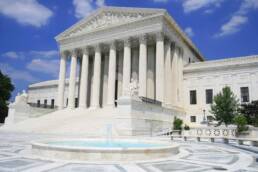On June 7, 2021, the Supreme Court issued a unanimous ruling and stated that certain individuals who have Temporary Protected Status (TPS) may not qualify for Lawful Permanent Residence (LPR). In Sanchez v. Mayorkas, the Court concluded that individuals who entered the US illegally and subsequently gained legal status through the TPS program are not eligible to apply for adjustment of status, which is the legal process of adjusting your temporary immigration status to that of a lawful permanent resident.
An Explanation of Temporary Protected Status (TPS)
Temporary Protected Status is type of limited protection given to individuals who are from countries deemed significantly dangerous. This designation allows the individual to remain in the United States until the country is removed from the TPS list. Often, TPS status is conferred when a major natural disaster or armed conflict plagues a foreign nation. It falls to the Secretary of Homeland Security to make a TPS designation. For the duration of TPS, individuals who qualify cannot be removed from the country, can obtain an Employment Authorization Document (EAD), and may be granted travel authorization. TPS also does not preclude an individual from pursuing a different immigration status, including permanent residence.
The Court’s Opinion
In Sanchez v. Mayorkas the Petitioner, Jose Santos Sanchez, was a citizen of El Salvador and challenged the denial of his application for permanent residence in the U.S. Mr. Sanchez entered the United States unlawfully in 1997 and was subsequently granted TPS in 2001. In 2014, Mr. Sanchez then applied for permanent residence and the United States Citizenship and Immigration Services (USCIS) determined that he was ineligible because he entered the United States unlawfully. Mr. Sanchez successfully challenged that decision before the District Court, which reasoned that TPS required treating him as if he had been lawfully admitted to the country for purposes of his LPR application. The Third Circuit subsequently reversed, and the Supreme Court granted certiorari.
The Supreme Court held that a TPS recipient who entered the United States unlawfully is not eligible for permanent residence status merely because he holds TPS. Eligibility for LPR status generally requires an “admission” into the country— defined to mean “the lawful entry of the alien into the United States after inspection and authorization by an immigration officer.” Here, Mr. Sanchez did not enter lawfully, and his TPS does not eliminate the effect of that unlawful entry. As such, Mr. Sanchez is not eligible for permanent residence.
If you have questions about TPS or lawful permanent residence in the United States, please do not hesitate to contact our office. We have a team of experienced attorneys that would be happy to assist.
Ready to have Berardi on your side?
Whether you’re a business looking to hire or a professional hoping to relocate, immigration law can be complicated. But you don’t have to do it alone. Put our experience to work for you.



